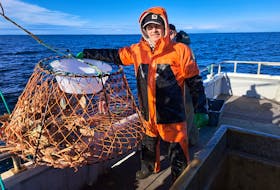In his Nov. 21 column, “Ocean geese meet ocean gander,” Russell Wangersky asked a critical question that Fisheries and Oceans Canada (DFO) should answer. If open-net pen aquaculture is being urgently phased out as non-sustainable in British Columbia, why is it being supported and expanded on Canada’s East Coast?
Newfoundland and Labrador is putting $30 million into the Grieg project with another $10 million coming from the Atlantic Canada Opportunities Agency. For a cash-strapped government, that is big bucks. Never mind the conflict of interest as regulator and the inevitable pollution of Placentia Bay.
Provincial governments in Nova Scotia and New Brunswick are also pouring vast amounts of money into a failed and destructive technology that has been shown to damage the ocean environment and, particularly, wild salmon populations. The job-starved Atlantic provinces can’t resist the lure of a few jobs. But DFO is constitutionally bound to protect wild fish species and the ocean environment. However, when it comes to open-net pen aquaculture, DFO is strangely silent and seemingly blind.
According to DFO, there is no problem with salmon aquaculture on the Atlantic coast. This amazing revelation came to light during consultations on a Federal Aquaculture Act.
The obvious but unspoken answer to Wangersky’s question is that if it’s bad for the West Coast and wild Pacific salmon, it’s bad for the East Coast and wild Atlantic salmon; Justin Trudeau, in his last election campaign, promised that the B.C. net pens would be coming out of the water by 2025, but made no reference whatsoever to Atlantic Coast salmon aquaculture. Why the big difference in approach to the same problem and the same industry in the same country? What are the differences between B.C. and Atlantic Canada that lets DFO do this double-deal?
According to DFO, there is no problem with salmon aquaculture on the Atlantic coast. This amazing revelation came to light during consultations on a Federal Aquaculture Act. What it means is that as far as DFO is concerned, there is no East Coast lobby screaming loud enough and long enough to get their ear. By contrast, there is a very loud and well-organized lobby on the West Coast led by First Nations groups. No similar lobby exists in N.L. or for wild salmon on the East Coast.
Next, there is a significant wild Pacific salmon industry in B.C. that stands to be damaged by open-net pen aquaculture. By contrast, there is no commercial salmon industry in the Atlantic provinces. Damage to wild Atlantic salmon as a species does not seem to matter. DFO has turned a blind eye to the myriad problems that open-net pen aquaculture has wreaked on wild Atlantic salmon.
In B.C., DFO is directly responsible for open-net pen aquaculture and the damage it causes to wild salmon populations. This comes as a result of a court decision in favour of Alexandra Morton, who challenged the authority of the B.C. government to regulate the aquaculture industry. In the Atlantic, region DFO has signed memoranda of understanding with the provinces which allows them to pass the regulatory authority for the aquaculture industry to the provinces. In turn, the provinces are jockeying to get the big multinational aquaculture companies like Grieg and Mowi to move here, regardless of the environmental fallout.
In N.L., the entire existing open-net pen industry was developed without a single project being required to register for an environmental assessment. We can all easily recall the alarming images from last year of pink salmon slurry being pumped into the ocean as a result of over 4 million salmon perishing in their net pens. Unfortunately, those images represent just one of many disasters that the open-net pen industry has caused and continues to cause.
Virtually all our south coast rivers have extensive interbreeding between escaped farm salmon and wild Atlantic salmon. Rivers like the Conne, which once boasted a run of about 10,000 salmon, is now lucky to see 300 return. In the meantime, our pristine bays and small coastal communities are being ravaged by an industry that is not sustainable.
As in B.C., problems like escapes, sea lice infestations and disease have severely impacted wild salmon populations. Canada is supposed to be one country, coast to coast. Perhaps we need a few more court cases to confirm that for DFO.
Leo White
St. John’s









